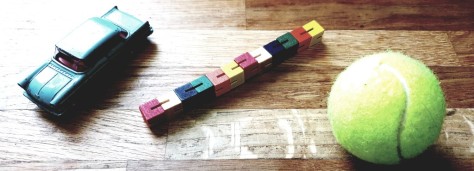It was early January and Rhys was due to start school after the summer. At the age of three and a half we had overcome so many challenges, but hundreds more lay ahead. I wanted to keep smashing down the barriers and not let his autism be a blocker to his achievements. Things were harder. Goals took longer to achieve. Additional support was needed. But together we could work out a way to succeed.
I opened his drawer and gathered up his clothes, with a goal in my mind that I was keen to work on and see him accomplish. I wanted him to be able to get dressed by himself, a simple but hugely challenging task for my little boy.
I looked at the socks in my hand and thought about how I pulled my slightly larger versions onto my feet daily without thinking. A task that had become a habit, but had probably taken me a lot of practice from a very young age.
Walking back to my room, I took a pair of my own socks from the drawer. Sitting on the end of the bed, I purposely concentrated on my actions, as I slipped my naked foot into the fluffy material. Gather up the sock, place over my toes, pull over my foot, around the heel, and then pull up over my ankle. A simple task for me, but a five step process which my son would need to master.
I gathered up Rhys’ clothes which I had collected from his room and started to lay them out on my bedroom floor. They formed a sequence, a visual schedule of clothes, with the pair of socks placed at the very end.I then grabbed my phone and took a picture of the setup and put it into my First-Then app followed by a reward of some bubbles.
“Rhys, get dressed, then bubbles” I said.
I sat Rhys down in front of the clothes sequence, and from left to right, I got Rhys dressed, with no expectation or request for him to do any of the actions himself. It was not about Rhys trying to put on any of the items, that was my job. The plan was for Rhys to complete the final step, and we would move backwards from there. I moved along the clothes sequence dressing Rhys, first his pants, then his trousers, and finally his T-Shirt, we finally approached the socks. I moved behind him and thought through the task breakdown I had identified earlier. I gathered up the sock, placed his foot into the opening, then pulled it up his foot and over his ankle. Coming to the final step of the task sequence I took hold of Rhys’ hands to help him do this part himself. Placing his thumbs between the sock and the skin of his ankle, I hand-over-hand, helped him pull the sock up his leg.
“Well done Rhys” I cheered, and hugged him with delight. He had accomplished the first (or last) step of the task. Following my promise, I filled the room with bubbles.
Over the next month, Rhys mastered the goal of pulling the sock up his leg all by himself, and we moved onto getting it pulled over his heel and then continuing backwards through the routine, to him placing his foot in the gap, finally gathering up the sock in his hand. Socks proved to be one of the most challenging goals, but step by step we got there, and Rhys managed to put on his own socks after a few months of hard dedication.
Every morning and every night when Rhys got ready for bed, I continued to lay out his clothes and pajamas in the same order to get dressed. As soon as he had mastered his socks, we continued to set goals from the end of the clothes sequence, breaking down each piece of clothing into simple steps.
It took a year in total, to get Rhys independently dressing himself, and now three years later Rhys still has his clothes laid out in the same order for him to get dressed.
Break down the goal.
Persevere.
Never give up.
It took Rhys a year, I would have kept going even if it had taken two!
***
Click here to get a step by step guide on using Backward Chaining.
*The content which I have shared is all a result of my own experience. I am not a qualified speech therapist or OT, I am just a parent who wants to share what has worked for us, and hopefully help others with my knowledge and experience.






